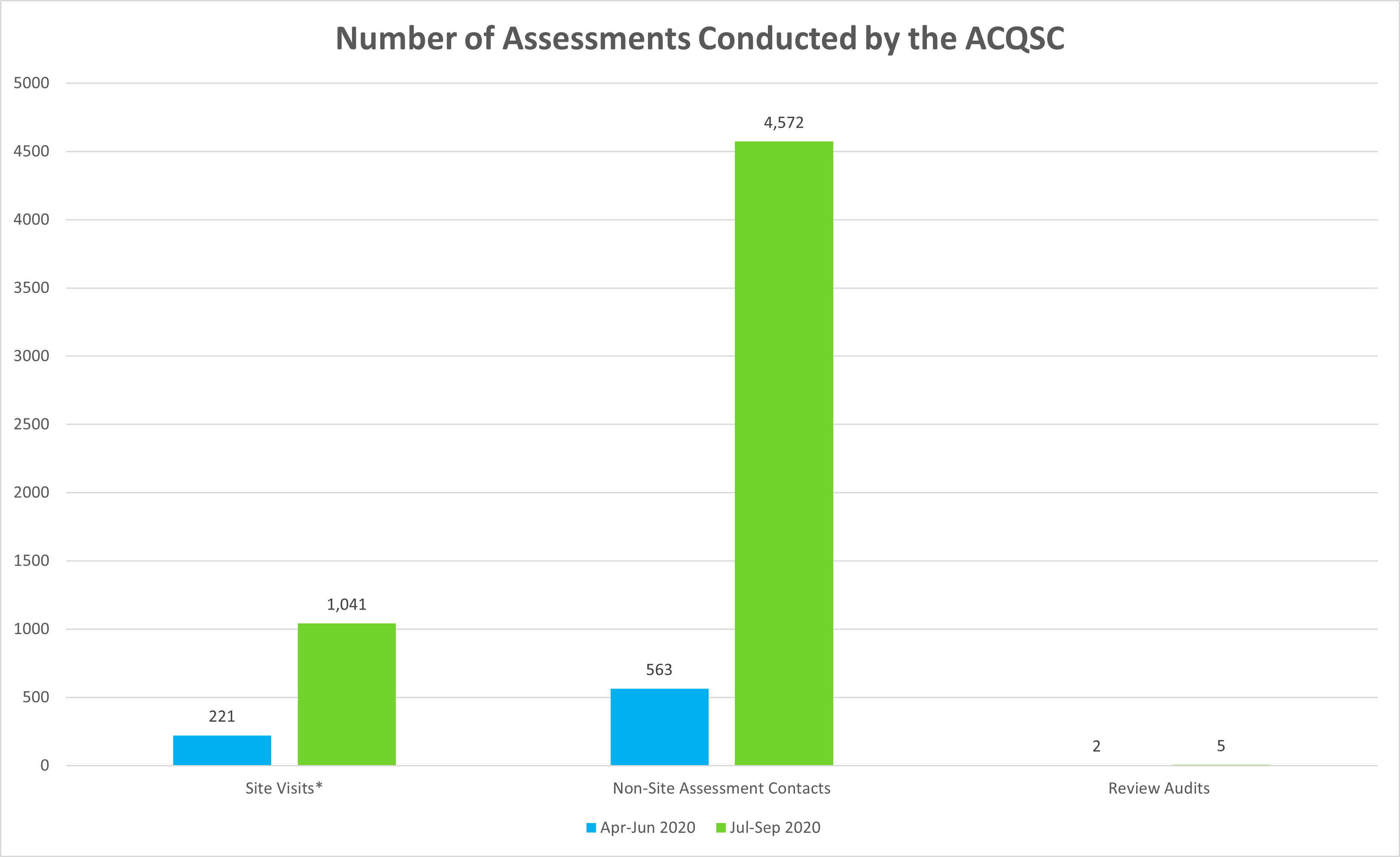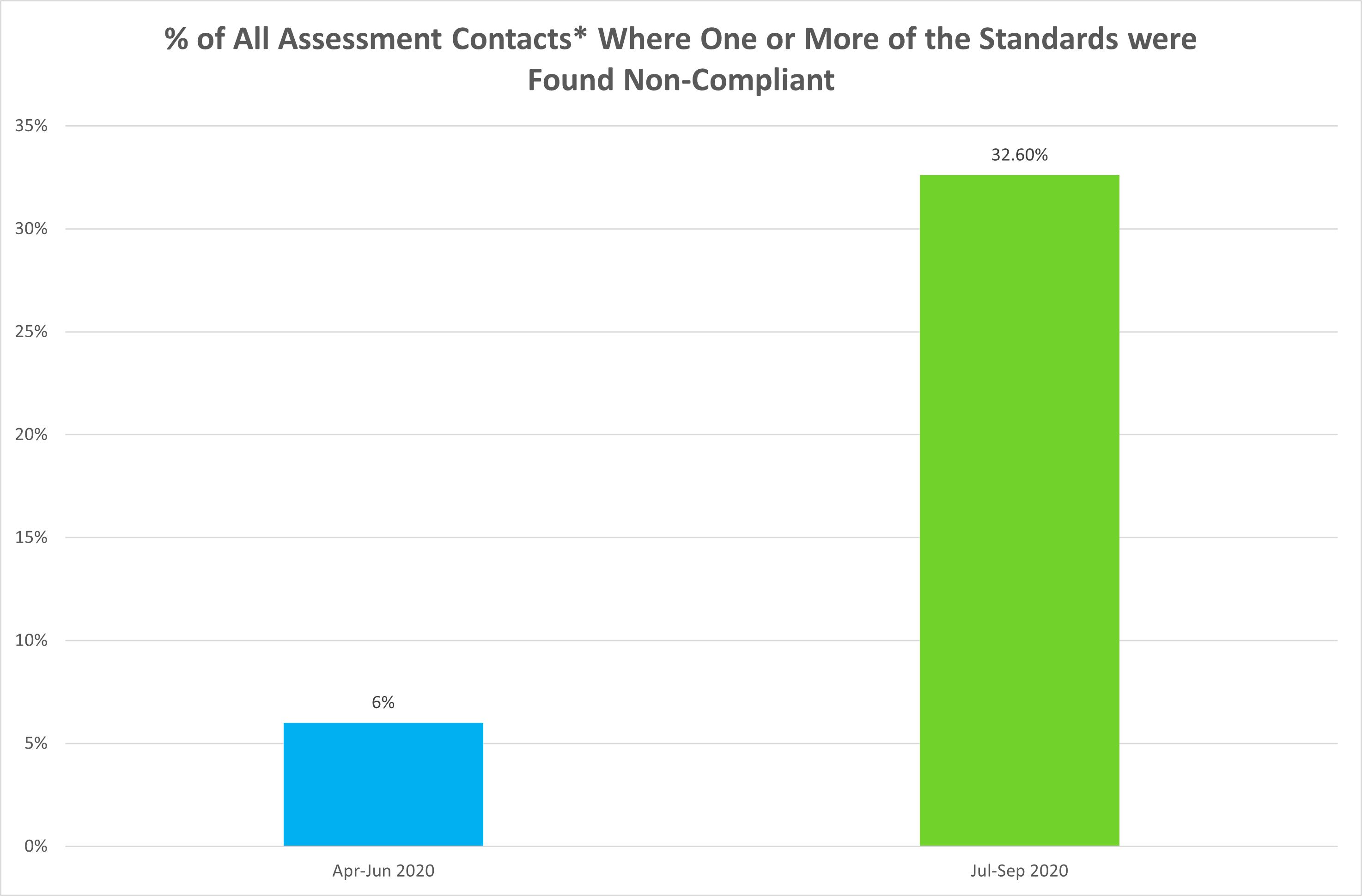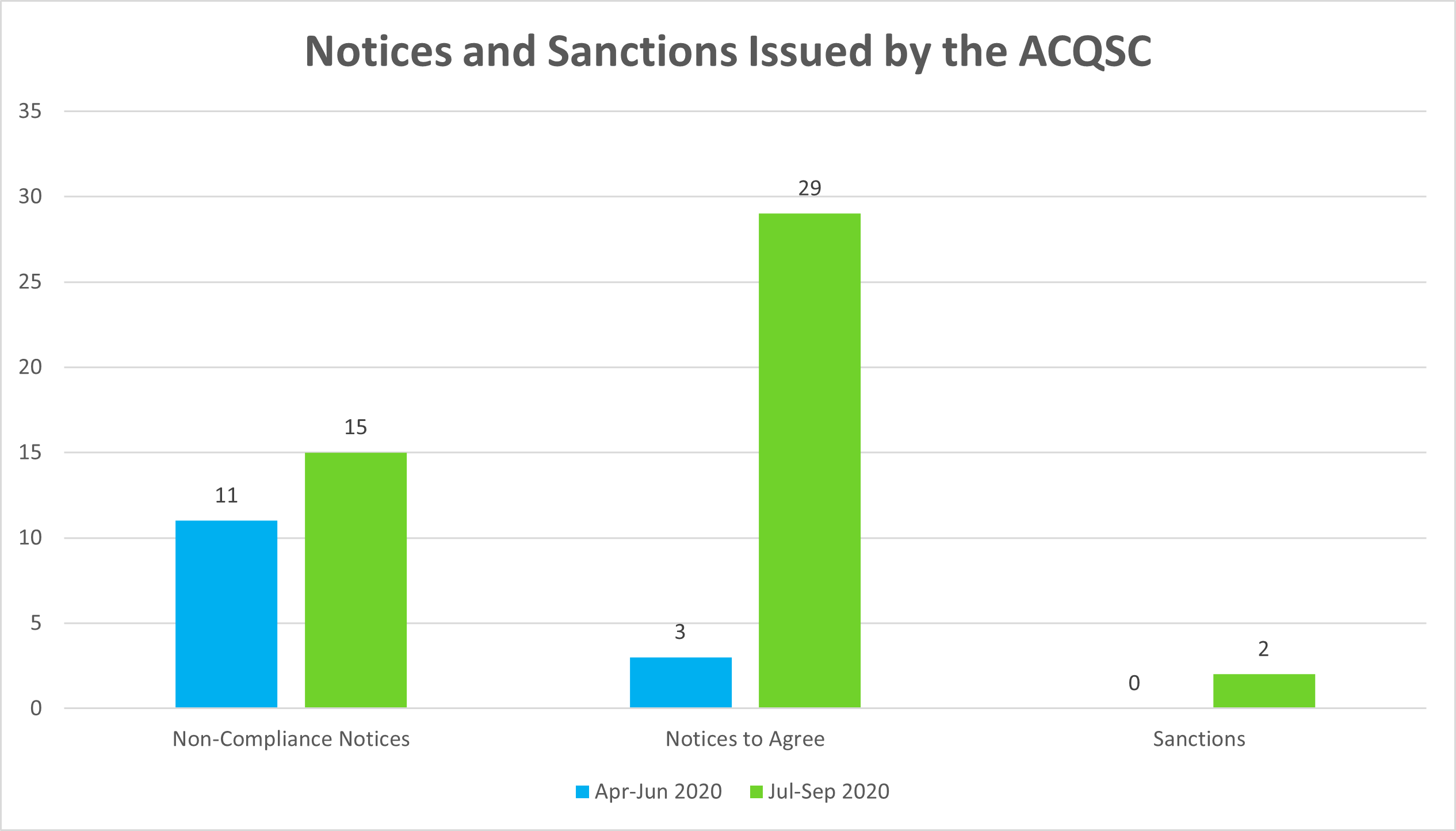The Aged Care Quality and Safety Commission (ACQSC) recently released its Sector Performance Report for the period July to September 2020.
The data in the report is designed to provide insight into the performance of the aged care industry. But it also provides insight into the way the ACQSC conducts assessments and is likely to conduct them in the future.
In this article we dig into the data from the latest ACQSC reports to identify key trends and outline what your residential care home can expect when it comes to assessment in 2021.
Overview: What to Expect in 2021
- Expect a lot more assessments – both on-site and off-site
- Expect more findings of non-compliance
- Expect a crackdown on clinical care and risk management
- Expect the ACQCS to “get tough early” and issue more Notices to Agree
- Expect the ACQSC to rarely impose sanctions
The two reports we are drawing on for this article are:
Aged Care Quality and Safety Commission Sector Performance Report April-June 2020
Aged Care Quality and Safety Commission Sector Performance Report July-September 2020
These reports are published a month after the end of the quarter they cover, so there is no data yet for the period October-December 2020.
The ACQSC uses a lot of confusing terminology – see the bottom of this article for a quick refresher on what the terms mean.
Expect a Lot More Assessments in 2021
If you compare the data from the two reports, you can see that in the latter half of 2020 the ACQSC massively increased the number assessments contacts it conducted. This may be because of improved practices and pressure arising from increased media scrutiny. Whatever the reason, the trend is probably going to continue into 2021.
On the left, you'll see a comparison of 'number of site visits' in April-June 2020 (in blue) and July-Sept 2020 (in green). There were 819 more visits in July-Sept. On the right you'll see a comparison of 'Non-Site Assessment Contacts' in April-June 2020 (in blue) and July-Sept 2020 (in green). There were 4,009 more non-site assessment contacts in July-Sept.

*Including site audits, review audits and assessment contacts on site.
Expect More Findings of Non-Compliance
Given that the ACQSC conducted more assessments in the latter half of 2020, it is natural for there also to be more findings of non-compliance. But findings of non-compliance have not only gone up as a whole number, they have gone up as a percentage as well.
In other words, the ACQSC is not only conducting more assessments, it is now also much more likely to find non-compliance at the conclusion of any given assessment.

*Includes on-site and off-site assessment contacts and infection control monitoring assessments. Excludes Site Audits and Review Audits.
Expect the ACQSC to Crack Down on Clinical Care and Risk Management
The ACQSC data includes a list of the particular requirements from the Aged Care Quality Standards that providers most often fail to comply with. These have changed slightly over the course of 2020, but some things have remained the same: clinical care and risk management were clearly the weak points for providers throughout 2020, so it’s wise to expect that the ACQSC will crack down on these areas in 2021.
| |
Apr-Jun 2020 |
Jul-Sep 2020 |
| 1 |
3 (3) (b) Effective management of high-impact or high-prevalence risks |
3 (3) (a) Safe and effective personal and clinical care |
| 2 |
3 (3) (a) Safe and effective personal and clinical care |
3 (3) (g) Open disclosure and complaints response |
| 3 |
5 (3) (b) Safe, clean and well maintained service environment |
3 (3) (b) High impact or high prevalence risks managed effectively |
| 4 |
8 (3) (d) Risk management systems and practices |
2 (3) (a) Safe and effective care and services |
| 5 |
7 (3) (a) Number and mix of workforce |
8 (3) (d) Risk management systems and practices |
Responses to Non-Compliance: Expect More Notices to Agree
Though the ACQSC remained fairly consistent in the number of Non-Compliance Notices it issued over the course of 2020, the last quarter has seen an increase in the number of Notices to Agree issued. Sanctions increased only slightly.
It is notable that in the latter half of 2020, the ACQSC issued more Notices to Agree than Non-Compliance Notices. A Notice to Agree is a more serious response than a Non-Compliance Notice (see the glossary below for details). This suggests that the ACQSC is willing to “get tough early” with providers. However, there is a limit to that toughness, as actual sanctions remain very rare.

Conclusion: Use this Data to Your Advantage
Overall, the trends in 2020 suggest that aged care providers will be seeing a lot more of the ACQSC in 2021, with assessments and findings of non-compliance occurring much more frequently. The data also suggests that the ACQSC is more likely to threaten a non-compliant provider with removal of accreditation status via the Notice to Agree.
However, before too much anxiety sets in, it’s worth noting that the data suggests that the ACQSC is very unlikely to follow through with this threat and is willing to work with providers to ensure their compliance.
Meanwhile, turn this data to your advantage by using it to:
- focus an audit to identify if your organisation is at risk of non-compliance
- inform your preparations for your next unannounced ACQSC visit and to ensure you have the appropriate evidence available to demonstrate compliance
- test and improve your self-assessment.
Also consider sharing the ACQSC’s latest report with your Board and other relevant committees, to assess the risks to your organisation and establish any priority areas to action.
Glossary
Here are the definitions of the key terms according to the ACQSC’s glossary:
Assessment Contact: Any form of contact (other than a site audit, a review audit or a quality review) between a Commission regulatory official and the approved provider of an accredited service or a previously accredited service for either or both of the following purposes:
a) to assess the provider’s performance, in relation to the service, against the Quality Standards
b) to monitor the quality of care and services provided by the provider through the service.
Non-Compliance Notice (NCN): A formal regulatory notice from the Commissioner to a provider stating that the provider has been found non-compliant with the Quality Standards or Prudential Standards. The Notice identifies the problems that need to be addressed by the provider to ensure that the Quality Standards or Prudential Standards are complied with, including a timeframe that they must be addressed by. Failure to respond to the Notice, or take action to address non-compliance may lead to sanctions being imposed under the Commission Act.
Notice to Agree: Notice sent to an approved provider when the Commission is considering revocation of its approval to deliver aged care, after identified non-compliance. The notice requires the approved provider to agree to certain requirements, including time frames. If the provider fails to agree to the requirements set out in the notice, the Commissioner may revoke approval to provide aged care services.
Review Audit: A comprehensive on-site assessment of a residential service provider’s performance against the Quality Standards and are most commonly used when the Commissioner considers the service may not be complying with the Quality Standards. Results in a decision whether to revoke a service’s accreditation, and if accreditation is not revoked, whether to vary the period of accreditation.
Site Audit: An unannounced comprehensive performance assessment against the Quality Standards undertaken for the purpose of informing a decision whether to re-accredit a residential service. Results in a decision of whether to re-accredit a service, and if re-accredited, the further period of accreditation. Site audits are also defined in the Rules as being an audit of the service conducted under Subdivision D of Division 3, Part 3.
Site Visit: A visit to a service or a consumer’s residence by regulatory officials or authorised complaints officers. In the context of a complaint, will include complaints officers meeting at any place with complainants, providers and any party to a complaint







